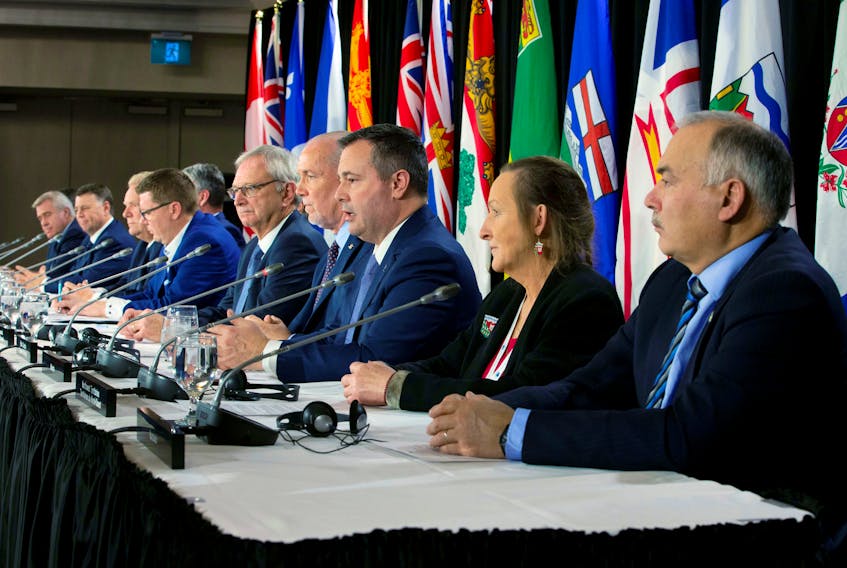Canada’s premiers came out of Monday’s Council of the Federation meeting with a shared list of demands for the new federal government, including an increase in federal health transfers and an overhaul of the fiscal stabilization program.
Amidst rhetoric about Western alienation and concerns about national unity following an election that revealed stark regional differences, the mood Monday among the premiers was one of congeniality and a willingness to work together.
“The Council of the Federation table was built on the principle of consensus, a place where premiers can come together and put aside our differences and work together on behalf of not just the people we represent in our respective jurisdictions, but work together on behalf of all Canadians from coast to coast,” Saskatchewan premier and Council of the Federation chair Scott Moe told reporters following the five-hour meeting in Toronto.
For Atlantic Canadian premiers, health-care delivery was the leading issue: all premiers reiterated their call for the federal government to increase funding by an annual escalator of 5.2 per cent to the Canadian Health Transfer in order to keep up with growing health-care costs.
“All four of the Atlantic premiers have been talking about the aging demographic, and this wave that's hitting us that we need to deal with, which is one of the most costly parts of health care,” said P.E.I. Premier Dennis King.

Nova Scotia Premier Stephen McNeil said he wasn’t sure whether a 5.2 per cent increase would be sufficient to deal with the challenges in his province, but it would be a good start.
“It was unanimous about the federal government needing to play a larger role in the delivery of health care. When the program started we were 50 per cent each. Currently, in our province, there's less than 20 per cent contributed (federally) towards the delivery of health care,” McNeil said.
“In order for us to be able to deliver the same quality of health care in our province as you can in some of the larger provinces we will require the national government to make that contribution.”

One area the premiers did not reach a consensus on was pharmacare, other than to emphasize that any program must be developed in partnership with the provinces and territories.
Newfoundland and Labrador Premier Dwight Ball, who has been vocal in his support for a national pharmacare plan, said more funding to tackle things like wait times would be moot if Canadians can’t afford medication.
“Canadians in every single province are having difficulty today making choices around the medications they have to buy, making decisions around food, heat and so on,” Ball said. “Any time we have the opportunity to expand pharmacare into places like Newfoundland and Labrador, these are the discussions that I want to have.”
Fixing fiscal stabilization

A major focus of the meeting was how to deal with the economic challenges faced by oil-producing provinces such as Alberta and Saskatchewan that have fuelled feelings of alienation, but the premiers avoided opening a discussion on the polarizing topic of equalization payments by agreeing to call on Ottawa to strengthen the federal fiscal stabilization program.
In its current form, the program is meant to enable the federal government to provide financial assistance to provinces that contribute to equalization and are faced with a year-over-year decline in their non-resource revenues greater than five per cent.
Some of the changes proposed by the premiers included removing the $60-per-capita cap of the program, and lowering the non-resource revenue threshold.
To illustrate the inefficiency of the program, Ball spoke about how, in 2016, Newfoundland and Labrador was faced with a loss of $1.1 billion in revenue from oil royalties on a budget of just over $7 billion.
“For Newfoundland and Labrador it was $7.9 billion staring down a $1.1 billion loss in revenue,” he said.
“When you use the word stabilization fund you think the intent would be to stabilize something. Well, it didn't work. It's outdated. It's been around since the ’80s. Thankfully, for the premiers and the support that we have at this table today, working with the federal government we will get a fund that is flexible, responsive and relevant to the needs of provinces like Newfoundland and Labrador, like Alberta, like Saskatchewan, but also for some other province in the future that might find itself in a similar situation.”
The premiers have sent a letter to the Prime Minister's Office outlining the four key areas of consensus and inviting Prime Minister Justin Trudeau to co-host a first ministers’ meeting early in the new year to discuss how to work together to achieve those objectives. The last first ministers’ meeting took place in Ottawa in 2016 and centred on the federal government's carbon-pricing regime.
[email protected]
Andrea Gunn on Twitter
RELATED: Big Oil sinking $4B into a deepwater hunt for Newfoundland's next monster project









